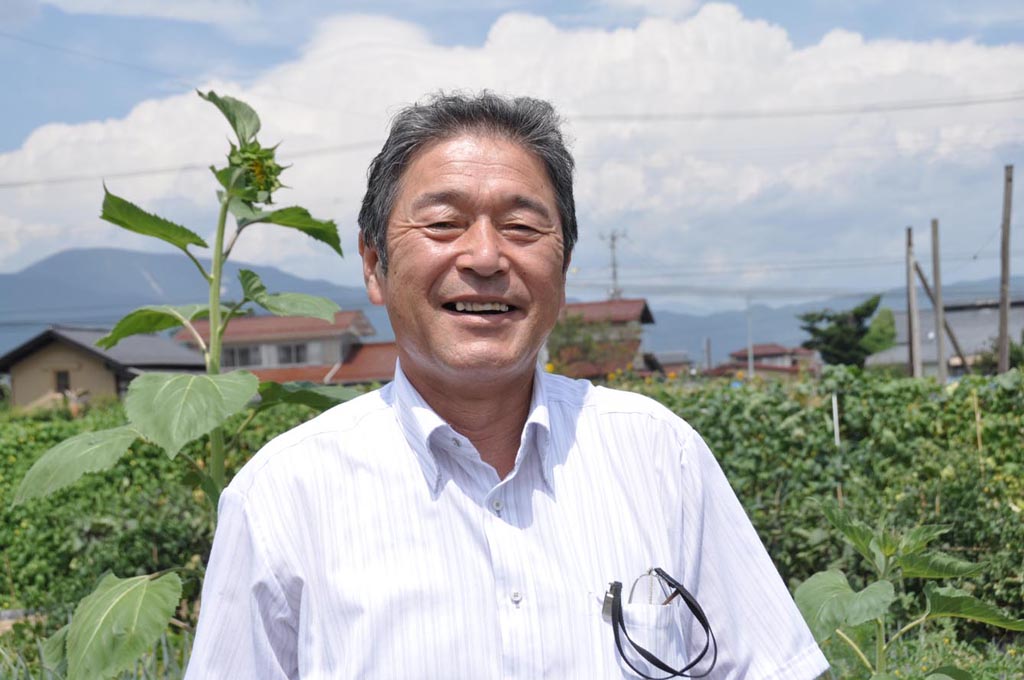 |
Mr. Kenichi Hasegawa
(Photo by Noboru Kobayashi)
|
Kenichi Hasegawa was born and raised in Iitate
Village and has lived continually in the village in Fukushima
Prefecture since he was born there in 1953. Before the village was
severely contaminated by the Fukushima Daiichi nuclear accident, the
dairy farmer raised cows and boars, living with his eight-member
family, including his parents, wife, children, and grandchildren.
In March 2011, the accident at Tokyo Electric Power
Company’s Fukushima Daiichi Nuclear Power Station showered Iitate,
selected as “one of the most beautiful villages”
** in
Japan, with
high-levels of radiation. The village had 20 wards, and Mr. Hasegawa
was the mayor of Maeda Ward. Having learned of the radioactive
contamination ahead of other villagers, he held a gathering of
residents, explained the ongoing situation, and told them how to avoid
radioactive exposure. Mr. Hasegawa demanded that the village
administration and Japanese government evacuate the villagers as soon
as possible, but the government’s evacuation order was not issued until
April 22, 2011. It was late June before all the villagers had left the
village.
After the accident, Mr. Hasegawa felt that he should
keep a visual record of the days of Iitate as one who was directly
involved in the situation. He purchased a video camera and digital
still camera and started to record the village as an amateur
cameraperson. The severe realities he saw through the cameras sometimes
made him unable to continue recording. However, he never gave up
recording the village scenes, and took more than ten thousand
photographs and 180 video DVDs up to December 2012.
I (the author) learned that Mr. Hasegawa was
recording scenes in Iitate when I participated in the No Nukes Asia
Forum in Korea in March 2012. The photographs by Mr. Hasegawa I saw
there represented the realities of the village. I was extremely
impressed, and started to consider introducing these visual records to
people not only in Japan but also around the world.
I visited Iitate in August 2012 with a research team
of six people. We had heard that the air radiation dose rates indicated
by the monitoring posts in Iitate were lower than the actual rates.
During the visit, the team members discussed what could be done for the
village. We decided to organize exhibitions of Mr. Hasegawa’s
photography and called for people to come forward to form a voluntary
organizing committee.
The photograph exhibition held in Tokyo in January
2013 attracted many visitors. Today, twenty exhibitions are being
organized in Japan. Exhibitions are also planned in Australia and
France.
The committee members would like you to volunteer to
organize, or help organize, an exhibition of Mr. Hasegawa’s photographs
in order to share his strong desire for the nuclear accident never to
be forgotten or the memories fade away.
* :Representative, Iitate Village
Photograph Exhibition Organizing Committee (TEL:
+81-44-987-7951, +81-80-3486-5090)
** :Iitate was selected as one of
the most beautiful villages by the
Alliance of Most Beautiful Villages in Japan, a group aiming to protect
irreplaceable landscapes and local cultures in Japanese agricultural,
mountainous villages, which can never be recovered once lost.

